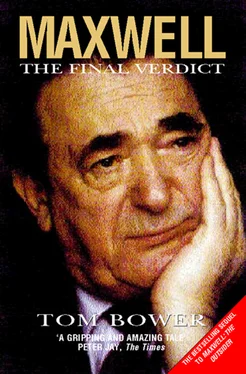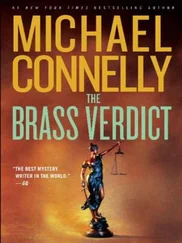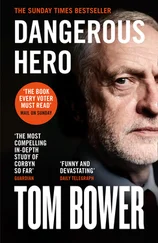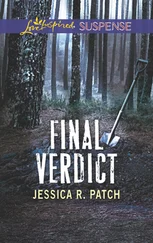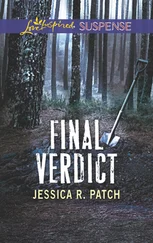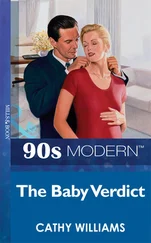Maxwell was uninterested. ‘Yes, yes,’ he smirked condescendingly. ‘Don’t worry. I know my business.’ He would renegotiate later, he reckoned. Getting the newspaper was all that mattered.
By then, gauging precisely how to impress New York, Maxwell had ordered the Lady Ghislaine to speed from Miami and moor on the marina by New York’s 34th Street, not far from the United Nations building. Ranked as he was by Forbes magazine as Britain’s sixth richest citizen personally worth £1.2 billion, his yacht – like his Oxford mansion – confirmed that Maxwell ‘lived like a king with kings’. In this floating headquarters, Maxwell dreamt of entertaining the emperors of America’s media: men like Steve Ross, Larry Tisch and Ochs Sulzberger. In the event his first guest on board was Jim Hoge, the News ’s publisher and president. ‘I am going to buy your newspaper,’ boomed Maxwell standing in stockinged feet to protect the thick-pile white carpet. ‘A whore’s rug,’ mused Hoge, who was nevertheless, like even the most hard-boiled New Yorkers, impressed by the vessel. ‘Maxwell’s walk-out didn’t work,’ he later observed. The Publisher would do anything to get the paper. The unions knew that he wouldn’t walk away.
On Monday morning, 11 March, the day of his self-imposed deadline, Maxwell sat across the negotiating table from Steve Ratner of Lazards, who had vouched to the Tribune company for his probity after consulting Bob Pirie of Rothschilds. In the Publisher’s absence they had been negotiating the Tribune’s payment to him. Pirie’s demands, made amid paroxysms of emotion, had bounced off Ratner’s array of cold calculations. ‘We want $70 million,’ burbled Pirie. ‘No way. $65 million is final,’ replied Ratner, knowing full well that the Tribune would indeed pay the extra $5 million to clinch a sale. Maxwell agreed to extend the deadline. Two days later, despite his passionate rhetoric, Pirie surrendered. Maxwell always demanded sycophants as advisers, and Pirie, keen to remain on the gravy train, failed to restrain his client’s own excitement. Ratner and the Tribune executives smiled at Pirie’s failure to get the last $5 million. Fed by his regular walks through the Macmillan lobby, surrounded by eager journalists and waving television cameras, Maxwell became infected by his own prominence and gradually lost the freedom to say the deal was off. The deal with the Tribune was only half the battle. Next, he needed to conclude the employment contracts with the trade unions.
At 11 p.m. on the 13th as Maxwell sat exhausted on the Lady Ghislaine drinking, unusually for him, vodka and orange, McDonald rang. ‘If we don’t sign tonight,’ he said, ‘it’s all off.’
‘Come down,’ said Maxwell, visibly not at his best when McDonald walked shoeless into the state room. For once the Publisher showed no appetite for attempting a last squeeze of the lemon. Thirty minutes later he clinched a deal which supposedly saved $72 million a year on costs. But he lost on critical issues. It was, McDonald would admit, ‘not the best he could have won. Maxwell could have got more concessions. We weren’t hurt as much as we might have been.’
Ratner was less diplomatic: ‘He was so arrogant and unreceptive to advice. He could have got a much better deal if he had driven harder. He lost tens of millions.’
‘We’re in danger of soon making a profit,’ Maxwell said with a smile as he approached waiting newsmen in the lobby of the Daily News building on 42nd Street. His red bowtie glowed incongruously below the plebeian blue Daily News baseball cap, artfully jammed on to his head. In classic Maxwell-speak, he announced a deal which was ‘historical and unprecedented’. Watching from the side as Maxwell basked in the publicity, Hoge understood the new owner’s motives as he stood amid cheering and weeping News employees. Maxwell then led the jubilant, ever growing throng towards the printing presses. The headline was already set. ‘Roll ‘Em!’ screamed his newest acquisition. As, with a great fanfare, he pressed the button to print 1 million copies, the headline was changed to ‘Cap’n Bob bites the Big Apple’. They were genuinely dancing in 42nd Street that night – on the pavements, in the road itself and on the delivery trucks. ‘Let’s see if Murdoch can beat this,’ shouted Maxwell, enraptured by the enthusiasm.
With the cheers still ringing, he was next led along Third Avenue by Pirie to Mr Fu’s, the ‘best Chinese restaurant in town’. As he sat down to spicy fish, John Lindsay, a former city mayor, led the applause for the man who had saved the News .
By daybreak, Maxwell was the news. ‘Brit saves Daily News’, blared a rival’s headline as the Great Saviour allowed himself to be sucked into a rapacious publicity machine. Every television and radio station beamed his voice across the city as he declared his love for New York, just as on earlier occasions he had expressed his love for Holland, Canada, Russia and Israel. Over the following six months, he pledged, he would remain as a ‘hands-on’ publisher. Maxwell, the star, was surrounded by genuine admirers. It was a glorious moment for him.
The previous night, John Campi, the newspaper’s energetic publicity director, had told Maxwell, ‘I want you at nine a.m. at the News stand outside 42nd Street. I’ll collect you from the boat. If you don’t turn up for this, the press will never show up again.’ With unusual punctuality, the Publisher arrived, donned a News hat once again and played to the hundreds who appeared. ‘Go, Maxwell!’ they yelled as autograph hunters thrust newspapers under his nose and women begged to get near the city’s latest hero. ‘I’ve been with celebrities all my life,’ thought Campi, ‘but this is big . He’s the biggest ticket.’
New Yorkers are not easily impressed, yet few remained unswayed by the Briton’s style. Living on board the Lady Ghislaine , Maxwell was repeatedly featured on television news programmes in whatever pose he desired: the mega-tycoon, interrupted by phone calls, receiving a parade of shoeless guests in the splendid state room bedecked with photographs of himself greeting world leaders. As the city bosses paid their respects, he was not averse to comparisons with Randolph Hearst. His presence was felt, and nowhere was it bigger than on his own newspaper’s front page, where – in all seriousness – he declared himself to be ‘a peacemaker’.
Once back inside the News building, the returning strikers discovered that the joviality was strictly confined to the streets outside. Lex Maxwelliana now ruled. Telephone operators were cursed for failing to man the switchboard twenty-four hours a day. Others were cursed for failing to leave their posts and greet their new employer. Among the first to be fired were 130 security men, spluttering bewilderment about who would protect the middle management from the ire of the returning strikers. Little did they realize that the managers were the next in line to be fired. The peacemaker’s presence was abruptly imposed: ‘When I call, I require instant service.’ Somewhere from beyond a voice counselled, ‘When Maxwell shouts “jump”, just ask, “how high?”’
‘Bob, you’ve lost the very people who can help you,’ sighed Hoge, who had decided weeks earlier to resign. His employer was oblivious to all but one mantra: ‘I bet Murdoch couldn’t have done this.’ To underline his challenge, Charlie Wilson was ordered to launch a new newspaper in New York, the Racing Times , to compete with Murdoch’s Racing Form . The gambler was going for broke.
Meetings, orders, summonses and declarations poured forth from a man whose task was herculean. Restoring a newspaper’s morale, motivation and style required the energy and leadership which were Maxwell’s forte. This was a rerun of the Daily Mirror in 1984, a challenge which only Maxwell was either sufficiently courageous or foolhardy to undertake. With time and money, he was sure of success. Juggling had always eventually proved profitable.
Читать дальше
